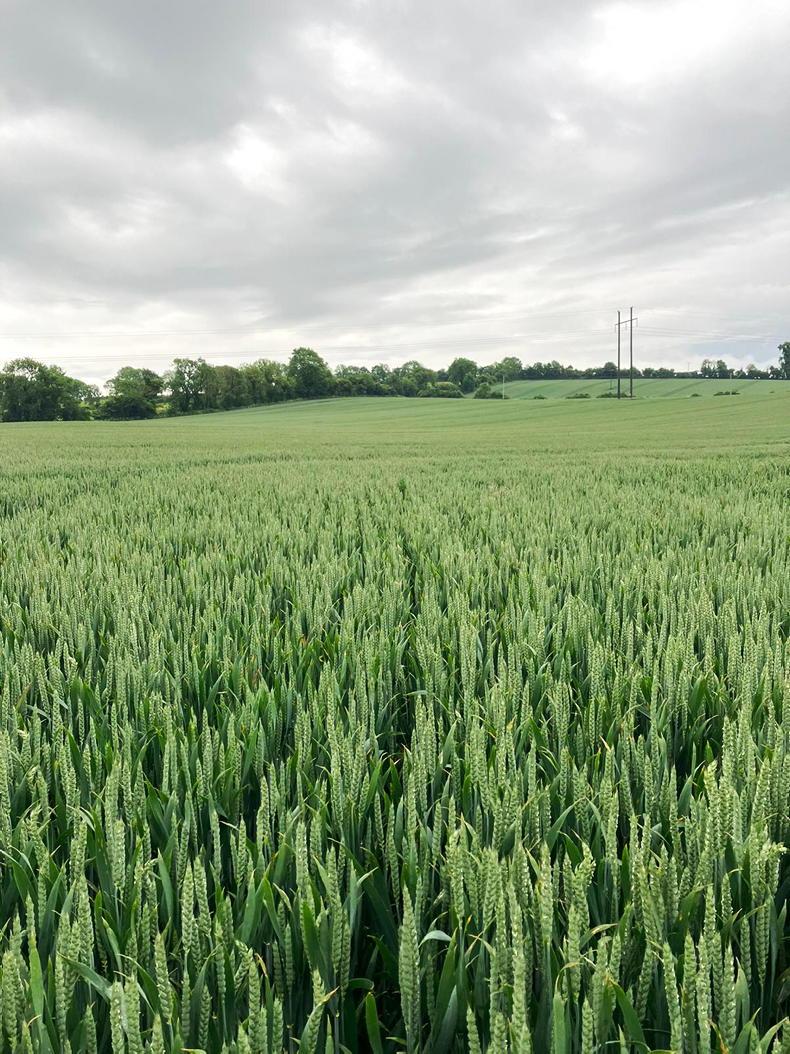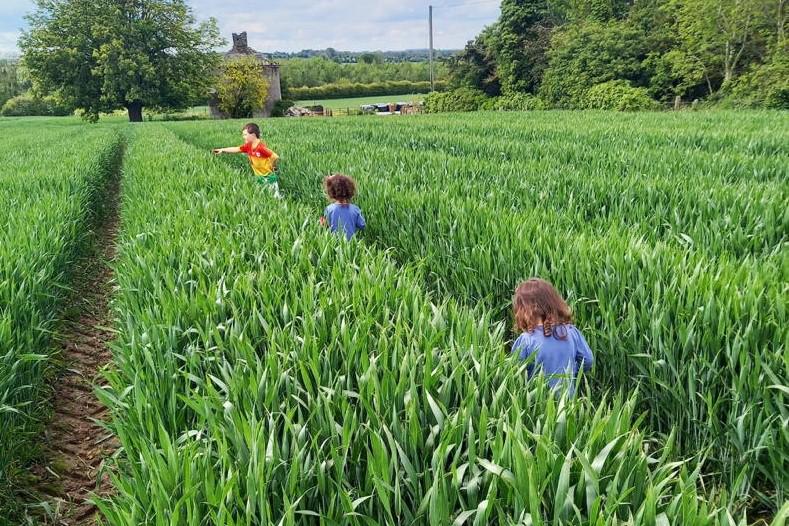Eamonn is very happy with his crops and has caught up on work. His winter wheat will need to be sprayed this week, but he is not in a panic to get this applied.
The swing to winter crops on the farm means there is not too much pressure on spraying as the gate is now closed on winter barley, winter oats and winter oilseed rape.
Winter oilseed rape received its final fungicide approximately two weeks ago which was 1l/ha of Amistar, along with 35l/ha of N16 at petal fall and Eamonn is really happy with its progress given that the overall N rate was pulled back this year. Pods are looking good and the crop has a good stand.

Winter wheat on Eamonn Cogan's farm.
Winter wheat
Winter wheat is due its final fungicide at the end of this week. It will receive a mix of prothioconazole and tebuconazole, along with Amistar.
There are no aphids present on the winter wheat crops at present. In a week to 10 days’ time N16 will be applied to the heads of winter wheat crops.
Spring oats had been struggling a month ago, but Eamonn described the rain in May as ideal and all crops responded well to it. His spring oats are a lovely green colour and will receive a fungicide application of Elatus Era at 0.6L/ha along with a plant growth regulator application of Moddus at 0.15l/ha and CeCeCe at 1l/ha in the coming days.
Winter barley has changed noticeably in recent days as grain fill continues and it begins to change colour. Crops look promising, but only the combine harvester will tell the whole story.
Aside from spraying, Eamonn is almost ready to roll for harvest. Combines and trailers have been serviced and he is working out logistics and drivers at present to make sure everything runs smoothly when the weather comes.
There has been no shortage of rain in the north of the country, but in general crops are looking well.
Kenny noted that his spring crops have suffered as a result of the recent weather. Spring barley crops are all over the place on growth stages and Kenny noted that they were stunted by cold and wet weather.
He has very little barley yellow dwarf virus. Kenny had not applied an aphicide in about 10 years, but when he was spraying his spring barley this year an aphid warning came through and he decided to add an aphicide to the mix. It now looks like this paid off.
Spring barley and wheat are being treated similarly at the T1 fungicide timing with both receiving Propel, which is prothioconazole, bixafen and spiroxamine. The spring wheat also received Folpet. Spring oats received Talius and Comet, while all three spring cereal crops received Medax Max to help with straw strength.

Spring barley is varying in growth statges.
In the winter wheat fields the final spray is about a week away, but Kenny is planning on applying Sakura (bromuconazole and tebuconazole) and Proline. At the T2 spray Kenny applied Revystar at 0.8l/ha, Comet at 0.4l/ha and Folpet at 1l/ha.
Oilseed rape is long finished at this stage, but the last fungicide was Boscalid-based. Kenny commented that he is happy with crops. His winter barley looks OK, but won’t be a bumper crop.
Kenny has been leaf testing for a number of years and across all crops there have been deficiencies in potassium, boron, manganese and magnesium and he noted that potassium and magnesium are a particular problem on the farm.
He applies nutrition as standard to his crops. For instance, on his T2 timing on winter wheat he applied straight magnesium and straight boron, along with potassium.
Things are busy in Carlow from spraying to looking for grass weeds in crops. Winter wheat is up for its T3 spray in the coming days. This will be Folicur at 1L/ha, along with 1l/ha of Arizona.
Spring beans are beginning to flower and will receive the first of a two-spray programme this week. This will consist of Signum at 0.7kg/ha, along with Nutri-Phite to help with downy mildew control.
Weed control in beet crops is down to its final spray with corn marigold and potatoes to be controlled. Dow Shield will be applied to these crops. One field of beet had been attacked by Mangold Fly, but is recovering well.
Spring wheat received Revystar and Folpet at T1 and will receive Aquino and Turret at flag leaf. The spring barley on the farm was late-sown so it will not receive its T2 fungicide for another week or so. Up to now it received Decoy at 0.33l/ha and Comet at 0.4l/ha at GS31, along with manganese, zinc and Terpal at 0.5l/ha. With low disease pressure the T2 will be cheap and cheerful if possible.
A key job being carried out in winter crops is walking for grass weeds. There is a zero tolerance approach to grass weeds on farm. George grows a lot of seed and he is finding that wild oats herbicides worked well, while there are small bits of brome here and there. He has noticed that the grass weeds are easy to pull, because there is good moisture in the ground.
George has a lot of seed crops on the farm, some of which are winter crops so to keep grass weeds under control he will apply Calaris to some of his maize crops. This year George has used two types of plastic on his maize – the oxo-degradable film which is in a use-up period due to the ban on single-use plastics and the new biodegradable film which will be used as a replacement. He has both plastic types side by side and has not noticed any difference in crop progress, with both breaking through the plastic at the same time.
Eamonn is very happy with his crops and has caught up on work. His winter wheat will need to be sprayed this week, but he is not in a panic to get this applied.
The swing to winter crops on the farm means there is not too much pressure on spraying as the gate is now closed on winter barley, winter oats and winter oilseed rape.
Winter oilseed rape received its final fungicide approximately two weeks ago which was 1l/ha of Amistar, along with 35l/ha of N16 at petal fall and Eamonn is really happy with its progress given that the overall N rate was pulled back this year. Pods are looking good and the crop has a good stand.

Winter wheat on Eamonn Cogan's farm.
Winter wheat
Winter wheat is due its final fungicide at the end of this week. It will receive a mix of prothioconazole and tebuconazole, along with Amistar.
There are no aphids present on the winter wheat crops at present. In a week to 10 days’ time N16 will be applied to the heads of winter wheat crops.
Spring oats had been struggling a month ago, but Eamonn described the rain in May as ideal and all crops responded well to it. His spring oats are a lovely green colour and will receive a fungicide application of Elatus Era at 0.6L/ha along with a plant growth regulator application of Moddus at 0.15l/ha and CeCeCe at 1l/ha in the coming days.
Winter barley has changed noticeably in recent days as grain fill continues and it begins to change colour. Crops look promising, but only the combine harvester will tell the whole story.
Aside from spraying, Eamonn is almost ready to roll for harvest. Combines and trailers have been serviced and he is working out logistics and drivers at present to make sure everything runs smoothly when the weather comes.
There has been no shortage of rain in the north of the country, but in general crops are looking well.
Kenny noted that his spring crops have suffered as a result of the recent weather. Spring barley crops are all over the place on growth stages and Kenny noted that they were stunted by cold and wet weather.
He has very little barley yellow dwarf virus. Kenny had not applied an aphicide in about 10 years, but when he was spraying his spring barley this year an aphid warning came through and he decided to add an aphicide to the mix. It now looks like this paid off.
Spring barley and wheat are being treated similarly at the T1 fungicide timing with both receiving Propel, which is prothioconazole, bixafen and spiroxamine. The spring wheat also received Folpet. Spring oats received Talius and Comet, while all three spring cereal crops received Medax Max to help with straw strength.

Spring barley is varying in growth statges.
In the winter wheat fields the final spray is about a week away, but Kenny is planning on applying Sakura (bromuconazole and tebuconazole) and Proline. At the T2 spray Kenny applied Revystar at 0.8l/ha, Comet at 0.4l/ha and Folpet at 1l/ha.
Oilseed rape is long finished at this stage, but the last fungicide was Boscalid-based. Kenny commented that he is happy with crops. His winter barley looks OK, but won’t be a bumper crop.
Kenny has been leaf testing for a number of years and across all crops there have been deficiencies in potassium, boron, manganese and magnesium and he noted that potassium and magnesium are a particular problem on the farm.
He applies nutrition as standard to his crops. For instance, on his T2 timing on winter wheat he applied straight magnesium and straight boron, along with potassium.
Things are busy in Carlow from spraying to looking for grass weeds in crops. Winter wheat is up for its T3 spray in the coming days. This will be Folicur at 1L/ha, along with 1l/ha of Arizona.
Spring beans are beginning to flower and will receive the first of a two-spray programme this week. This will consist of Signum at 0.7kg/ha, along with Nutri-Phite to help with downy mildew control.
Weed control in beet crops is down to its final spray with corn marigold and potatoes to be controlled. Dow Shield will be applied to these crops. One field of beet had been attacked by Mangold Fly, but is recovering well.
Spring wheat received Revystar and Folpet at T1 and will receive Aquino and Turret at flag leaf. The spring barley on the farm was late-sown so it will not receive its T2 fungicide for another week or so. Up to now it received Decoy at 0.33l/ha and Comet at 0.4l/ha at GS31, along with manganese, zinc and Terpal at 0.5l/ha. With low disease pressure the T2 will be cheap and cheerful if possible.
A key job being carried out in winter crops is walking for grass weeds. There is a zero tolerance approach to grass weeds on farm. George grows a lot of seed and he is finding that wild oats herbicides worked well, while there are small bits of brome here and there. He has noticed that the grass weeds are easy to pull, because there is good moisture in the ground.
George has a lot of seed crops on the farm, some of which are winter crops so to keep grass weeds under control he will apply Calaris to some of his maize crops. This year George has used two types of plastic on his maize – the oxo-degradable film which is in a use-up period due to the ban on single-use plastics and the new biodegradable film which will be used as a replacement. He has both plastic types side by side and has not noticed any difference in crop progress, with both breaking through the plastic at the same time.








 This is a subscriber-only article
This is a subscriber-only article










SHARING OPTIONS: